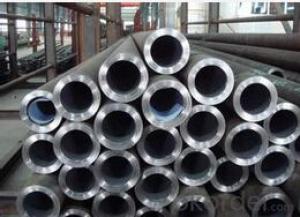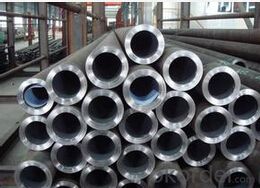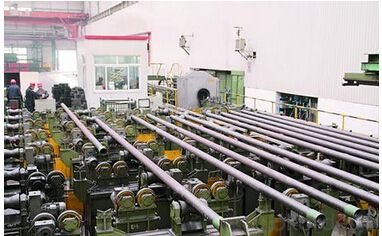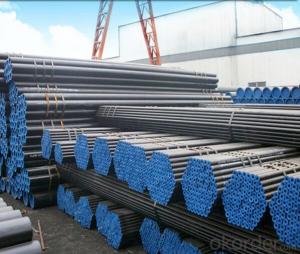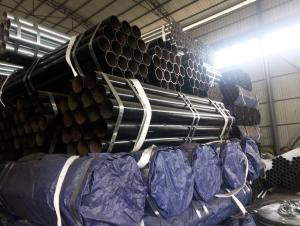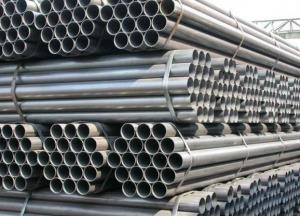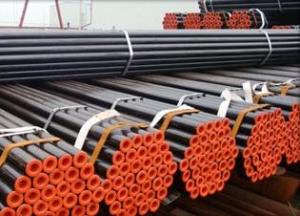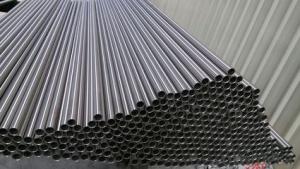boiler tube seamless carbon steel pipe for high pressure
- Loading Port:
- Tianjin
- Payment Terms:
- TT OR LC
- Min Order Qty:
- 25 m.t.
- Supply Capability:
- 60000 m.t./month
OKorder Service Pledge
OKorder Financial Service
You Might Also Like
Specifications
1. Min Order : 20 tons
2.OD: 20mm --508mm
3. WT: 3mm -- 60mm
4.Certification: ISO & API
seamless steel pipes for high pressure boiler tube
1) Standard: API Standard:ASTM A106.ASTM A53,ASTM A135,ASTM A179,ASTM A214,ASTM A192,ASTM A226,ASTM A315,ASTM A178,ASTM A210,ASTM A333,ASTM A355,ASTM A369,ASTM A334 ASTM/ASME A312/SA312, ASTM/ASME A213/SA213, ASTM A269,ASTM 511,API5L,API5CT, GOST 9940,GOST 9941,JIS G 3459, JIS GS3463, GS3467, JIS G3448, DIN EN 10216-2006(DIN 17458) , DIN EN 10297-2006(DIN 17456) etc.
2) Steel Grade: ASTM A106 GRB,A53 GRB. API 5L GRB,API 5 CT N80,K55,A335 P11.P91,DIN ST52,ST44,ST35.8,ST37,ST42,ST45
3)Outside Diameter:1/2"-20" Or 21.3-508mm
4) Wall Thickness: 3-40mm
5) Application: The products are widely used in fertilizer, petroleum, central-station, boiler, power station, shipping military, chemical industry, environment protection, traffic, metallurgy and mine, printing and dyeing, food industry, medical equipment, and so on.
Production Equipment :
30 sets of Cold-drawn Machinery (Model: 3 ton to 500 ton)
Cold-rolled Machinery: Model LD-30, LD-60, LG-90H (L), LG-159H (L)
Automatic Roller Solution & Annealing Heat Treatment Equipment
18-meter-long Pickling Sin
QUALITY ASSURANCE:
1) Strictly acc. ASTM,DIN,JIS,EN,GOST etc
2) Sample: We are accept your sample requirement
3) Test: Eddy current / hydrostatic/ Ultrasonic/ Intergranular Corrosion or according to customers' request
3) Certificate:API, CE ,ISO9001.2000.MTC etc
4) Inspection: BV,SGS,others is avaliable.
High Quality Package :
1) In bundle with strip;
2) First packing by plastic bag then strip; Details packing please see the picture in the detial description.
3) In bulk
4) Client' requirements
5) Delivery: 1) Container: 25 tons/container for pipe with usual outer diameter. For 20" container the max length is 5.8m; For 40" container the max length is 11.8m.
2) Bulk carrier: It is no requirements to the length of the pipe. But its booking space time is long.
Our Advantages:
1) Fast Delivery: around 10days below 50Metric Tons after sight of Irrevocable L/C or Deposit;(lot of high quality steel pipe in stock)
2) Quality Assured: Strictly acc. To International standard ASTM & BS & EN & JIS, with System ISO certification
3) Good Service: supplied professional technical guide free of charge at anytime;
4) Reasonable Price: to be better support your business;
- Q: How are steel pipes used in the infrastructure development?
- Steel pipes are widely used in infrastructure development for various purposes such as water supply, sewage systems, gas pipelines, and transportation of oil and natural gas. They provide a durable and efficient solution for the construction of underground and aboveground infrastructure, ensuring the safe and reliable transportation of fluids and gases. Steel pipes are also used in the construction of bridges, buildings, and other structural components, as they offer strength, versatility, and resilience to withstand harsh environmental conditions.
- Q: Is steel pipe made of profiles?
- In accordance with the different smelting quality of steel, steel is divided into ordinary steel and high quality steel. According to the current catalogue of metal products, ordinary steel can be divided into large section steel, medium section steel and small section steel. The section steel can be divided into I-beam, channel steel, angle steel, round steel and so on according to its sectional shape.
- Q: The difference between 12Cr1MoVG alloy steel tube and 15CrMo
- 12Cr1MoVG is a kind of material for alloy tubes. The main purpose is to make the steel structure in the boiler, the use temperature of 580 degrees, requiring high temperature resistance steel plate, durable strength, steel plate in the normalized and tempered state delivery. 12Cr1MoV alloy tube is based on high quality carbon structural steel. It is appropriate to add one or more alloy elements to improve the mechanical properties, toughness and hardenability of steel.
- Q: Can steel pipes be used for underground cable protection?
- Yes, steel pipes can be used for underground cable protection. Steel pipes offer durability, strength, and resistance to corrosion, making them suitable for protecting cables from external elements and potential damage. Additionally, steel pipes can provide a secure and reliable conduit for underground cables, ensuring their safety and longevity.
- Q: How do you determine the wall thickness of a steel pipe?
- To determine the wall thickness of a steel pipe, there are a few methods you can use. The most common and accurate method is to measure it using a caliper or micrometer. First, ensure that the pipe is clean and free from any debris or rust. Then, take the caliper or micrometer and gently place it around the circumference of the pipe, making sure it is perpendicular to the surface. Carefully close the jaws of the measuring tool until they are snug against the pipe, but not so tight that they deform the shape. Once the jaws are closed, read the measurement displayed on the tool. This measurement represents the distance between the inner and outer diameter of the pipe, which is equal to the wall thickness. Alternatively, if you don't have access to a caliper or micrometer, you can use a pipe wall thickness gauge. These gauges have a set of pins or rollers that can be inserted into the pipe, providing you with an accurate measurement. Simply insert the pins into the pipe, ensuring they are properly aligned with the wall, and check the reading displayed on the gauge. It's important to note that when measuring the wall thickness of a steel pipe, you should take multiple readings at different points along the pipe to account for any variations. This will provide you with a more accurate average measurement.
- Q: Can steel pipes be used for water supply lines?
- Yes, steel pipes can be used for water supply lines. Steel pipes are durable and have high tensile strength, making them suitable for carrying water. However, it is important to ensure that the steel pipes are properly treated to prevent corrosion and rusting.
- Q: How can galvanized steel pipe be connected with stainless steel pipe?
- Welding methods are used to connect. Because galvanized pipe is in fact carbon steel pipe, so galvanized pipe and stainless steel pipe welding, in fact, carbon steel and stainless steel welding, welding of dissimilar materials.
- Q: How do you calculate the pipe pressure loss coefficient for steel pipes?
- To calculate the pipe pressure loss coefficient for steel pipes, you can use various empirical equations or reference charts specific to the pipe type and size. These equations and charts take into account factors such as pipe roughness, Reynolds number, and flow rate to determine the pressure loss coefficient. It is important to consult relevant engineering references or software to accurately calculate this coefficient for steel pipes.
- Q: What are the common maintenance practices for steel pipes?
- Steel pipes require regular inspections, cleaning, and corrosion prevention as part of their maintenance. It is crucial to conduct inspections frequently to detect any signs of damage or wear. These inspections can involve visual assessments and non-destructive testing methods like ultrasonic or magnetic particle inspection. Scheduling inspections ensures early detection of issues, allowing for prompt resolution. Cleaning is also a vital maintenance practice for steel pipes. It involves the removal of dirt, debris, and scale that may accumulate on both the inside and outside of the pipes. Regular cleaning prevents blockages, enhances flow efficiency, and reduces the risk of corrosion. Corrosion prevention plays a significant role in maintaining steel pipes. Different methods, such as applying protective coatings, utilizing cathodic protection systems, or implementing corrosion inhibitors, can be employed to safeguard the pipes. These measures extend the pipes' lifespan and preserve their structural integrity over time. Additional maintenance practices may include repairing or replacing damaged sections of the pipes, maintaining proper insulation to prevent heat loss or gain, and monitoring the pipes for any signs of leakage or pressure drops. In summary, regular inspections, cleaning, and corrosion prevention are vital maintenance practices for steel pipes. Implementing these practices prolongs the pipes' lifespan and allows for the identification and resolution of potential issues before they cause significant damage or disruptions.
- Q: What are the factors to consider while selecting steel pipes for a project?
- When selecting steel pipes for a project, some important factors to consider include the intended application or purpose of the pipes, the required strength and durability, the size and dimensions needed, the corrosion resistance requirements, the availability and cost, and any specific industry standards or regulations that need to be met.
Send your message to us
boiler tube seamless carbon steel pipe for high pressure
- Loading Port:
- Tianjin
- Payment Terms:
- TT OR LC
- Min Order Qty:
- 25 m.t.
- Supply Capability:
- 60000 m.t./month
OKorder Service Pledge
OKorder Financial Service
Similar products
Hot products
Hot Searches
Related keywords
